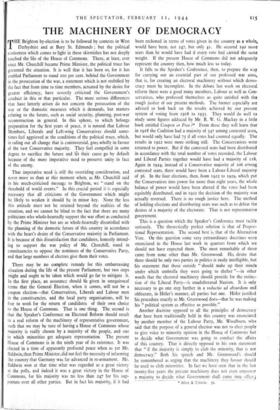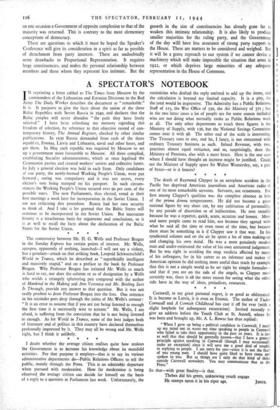THE MACHINERY OF DEMOCRACY
THE Brighton by-election is to be followed by contests in West Derbyshire and at Bury St. Edmunds ; but the political restiveness which comes to light in these skirmishes has not deeply touched the life of the House of Commons. There, at least, ever since Mr' Churchill became Prime Minister, the political truce has governed the situation. It is well that it has been so, for it has enabled Parliament to stand too per cent. behind the Government in the prosecution of the war, a statement which is not stultified by the fact that from time to time members, actuated by the desire for greater efficiency, have severely criticised the Government's conduct in this or that particular. The more serious differences that have latterly arisen do not concern the prosecution of the war or the domestic measures which it demands, but matters relating to the future, such as social security, planning, post-war reconstruction in general. In this sphere, to which belongs preparation for the first years of peace, it is natural that Labour Members, Liberals and Left-wing Conservatives should some- times feel aggrieved at the conditions of the political truce, which, in ruling out all change that is controversial, goes wholly in favour of the vast Conservative majority. They feel compelled in some degree to sacrifice the future and let their cause go by default because of the more imperative need to preserve unity in face of the enemy.
That imperative need is still the overriding consideration, and never more so than at this moment when, as Mr. Churchill said in his much-criticised message to Brighton, we "stand on the threshold of world events." In this crucial period it is especially necessary that all criticisms of the Government which might be likely to weaken it should be in minor key. None the less this attitude must not be strained beyond the realities of the situation, and. we cannot be blind to the fact that there are many politicians who whole-heartedly support the war effort as conducted by the Prime Minister but are as whole-heartedly dissatisfied with the planning of the domestic future of this country in accordance with the heart's desire of the Conservative majority in Parliament. It is because of this dissatisfaction that candidates, honestly intend- ing to support the war policy of Mr. Churchill, stand in constituencies to oppose the nominees of the Conservative Party, and that large numbers of electors give them their votes.
There may be no complete remedy for this embarrassing situation during the life of the present Parliament, but two steps might and ought to be taken which would go far to mitigate it. In the first place, an assurance should lie given in unequivocal terms that the General Election, when it comes, will not be a coupon election—that Conservatives, Liberals and Labour men in the constituencies, and the local party organisations, will be free to work for the return of candidates of their own choice to the House of Commons. That is one thing. The second is that the Speaker's Conference on Electoral Reform should result in a real reform of the machinery of representative government, such that we may be sure of having a House of Commons whose majority is really chosen by a majority of the people, and one in which minorities get adequate representation. The present House of Commons is in the ninth year of its existence. It was elected in a time of apparently profound peace when as yet Mr. Baldwin,then Prime Minister, did not feel the necessity of informing the country that Garmany was far advanced in re-armament. Mr. Baldwin won at that time what was regarded as a great victory at the polls, and indeed it was a great victory in the House of Commons, for his majority was no less than 247 for his sup- porters over all other parties. But in fact his majoritx, if it had been reckoned in terms of votes given in the country as a whole, would have been, not 247, but only 41. He secured 190 more seats than he would have had if every vote had carried the same weight. If the present House of Commons did not adequately represent the country then, how much less so today.
It falls to the Speaker's Conference, then, to prepare the way for carrying out an essential part of our professed war aims, that is, for creating an electoral machinery without which demo- cracy must be incomplete. In the debate last week on dectoral reform there were a good many members, Labour as well as Con- servatives, who professed themselves as quite satisfied with the rough justice of our present methods. The former especially are advised to look back on the results achieved by ,our present system of voting from 1918 to 1935. They would 'do well to study some figures adduced liy Mr. R. W. G. Mackay in a little book entitled Coupon or Free ?* From these they will learn that in 1918 the Coalition had a majority of 347 among contested seats, but would only have had 75 if all votes had counted equally. The results in 1922 were more striking still. The Conservatives were returned to power. But if the contested seats had been distributed in accordance with the total number of votes recorded, the Labour and Liberal Parties together would have had a majority of 118. Again in 1924, instead of a Conservative majority of 206 among contested seats, there would have been a Labour-Liberal majority of 36. In the four elections, then, from 1922 to 1929, which put the Conservatives into power for more than eight years, the whole balance of power would have been altered if the votes had been equitably distributed, and in 1922 the decision of the majority was actually reversed. There is no rough justice here. The method of holding elections and distributing seats was such as to defeat the desires of a majority of the electorate. That is not representative government.
This is a question which the Speaker's Conference must tackle seriously. The theoretically perfect solution is that of Propor- tional Representation. The second best is that of the Alternative Vote. On this question some very extraordinary doctrines were enunciated in the House last week in quarters from which we should not have expected them. The most remarkable of these came from none other than Mr. Greenwood. His desire that there should be only two parties in politics is easily intelligible, but his statement that those outside "should make up their minds under which umbrella they were going to shelter "—in other words that the electoral machinery should provide for the extinc- tion of the Liberal Party—is unadulterated Nazism. It is only necessary to go one step further in a reductio ad absurdum and obliterate, in Hitler's manner, all parties but one. Hitler justified his procedure exactly as Mr. Greenwood does—that he was making his "political system as effective as possible."
Another doctrine opposed to all the principles of democracy that have been traditionally held in this country was enunciated by another member of the Labour Party, Mr. Woodburn, who said that the purpose of a general election was not to elect people to give voice to minority opinion in the House of Commons but to decide what Government was going to conduct the affairs of this country. That is directly opposed to his own statement that "if the majority is simply to club the minority, that is not democracy." Both his speech and Mr. Greenwood's should be remembered as urging that the machinery they favour should be used to club minorities. In fact we have seen that in the last twenty-five years the present machinery does not even empower a majority to decide what Government shall come into office ; * Allen SE Unwin. 55. on one occasion a Government of opposite complexion to that of the majority was returned. This is contrary to the most elementary conceptions of democracy.
These are questions to which it must be hoped the Speaker's Conference will give its consideration in a spirit as far as possible of detachment from party interests. There are undoubtedly some drawbacks to Proportional Representation. It requires large constituencies, and makes the personal relationship between members and those whom they represent less intimate. But the growth in the size of constituencies has already gone far to weaken this intimate relationship. It is also likely to produce smaller majorities for the ruling party, and the Government of the day willl have less assurance of strong party support in the House. These are matters to be considered and weighed. But it will be a grave reproach to our system if we cannot devise a machinery which will make impossible the situation that arose in 1922, or which deprives large minorities of any adequate representation in the House of Commons.



























 Previous page
Previous page